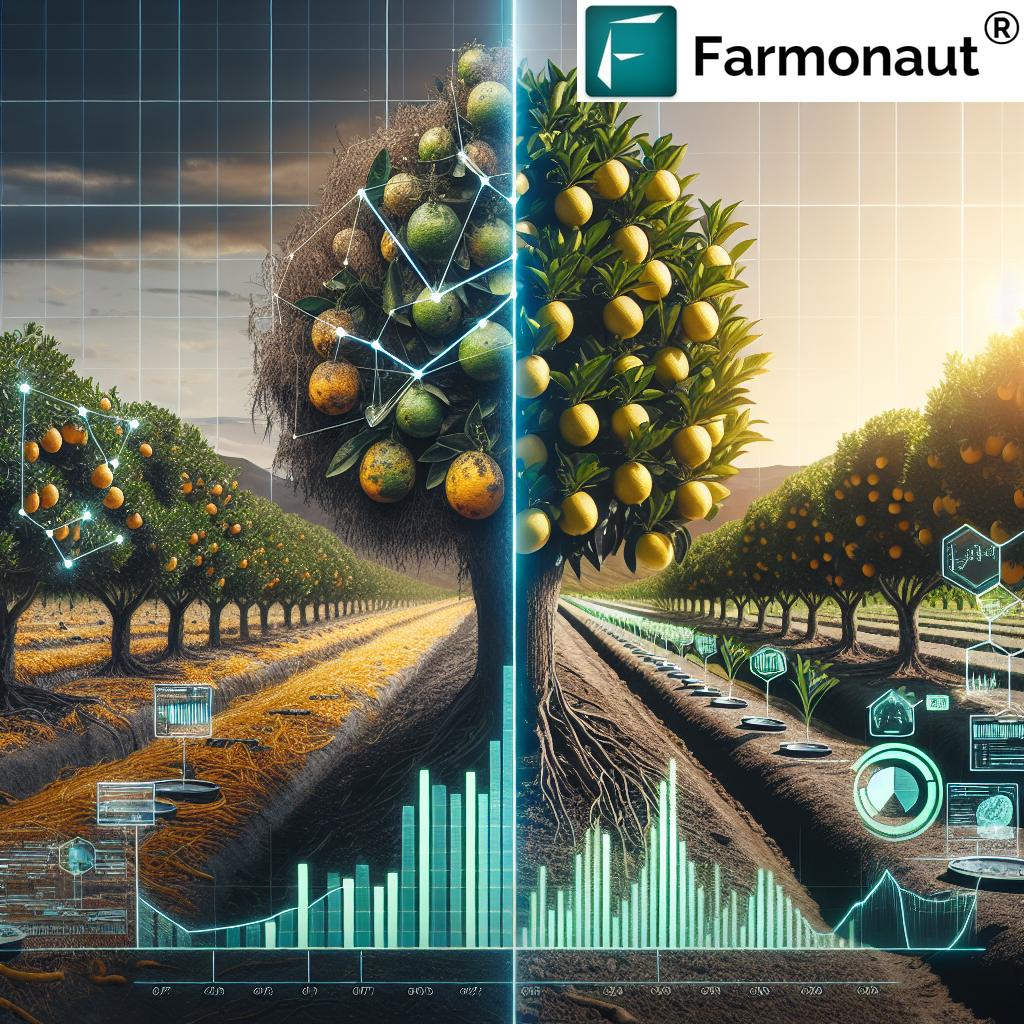Florida Citrus Industry’s Fight for Survival: Overcoming Greening, Hurricanes, and Market Challenges
In the Sunshine State, where citrus groves have long been an iconic part of the landscape and economy, the Florida citrus industry faces an unprecedented battle for survival. As we delve into the multifaceted challenges confronting this vital sector, we’ll explore the impacts of citrus greening disease, devastating hurricanes, and shifting market dynamics. Join us as we uncover the innovative strategies and technologies, including those offered by Farmonaut, that are shaping the future of citrus production in Florida.

“Florida’s orange production is forecast to drop to just 12 million boxes in 2024, a 33% decrease from the previous year.”
The Citrus Greening Crisis
At the heart of the Florida citrus industry’s struggle lies a formidable foe: citrus greening disease. This untreatable bacterial infection, transmitted by the Asian citrus psyllid, has decimated orange groves across the state. The impact of this disease cannot be overstated:
- Infected trees produce bitter, misshapen fruit
- Crop yields have plummeted by up to 75% over the past two decades
- The disease has affected nearly every citrus-growing county in Florida
The relentless spread of citrus greening has forced growers to adapt or face the possibility of abandoning their orchards altogether. As we grapple with this crisis, innovative solutions are emerging, offering a glimmer of hope for the industry’s future.
Hurricane Havoc: Nature’s Assault on Citrus Groves
As if citrus greening weren’t challenging enough, Florida’s orange groves have been battered by an increasing frequency of severe hurricanes. These natural disasters have compounded the industry’s woes:
- Hurricane Milton struck just before harvest, impacting 70% of the most productive orchards
- Storm surges and flooding have led to root rot and tree loss
- High winds have stripped fruit from trees and damaged infrastructure
The cumulative effect of these weather events has been catastrophic, further straining an already vulnerable industry. Climate-resilient agriculture practices have become not just beneficial but essential for the survival of Florida’s citrus groves.
Market Dynamics: From Staple to Luxury
The devastating impacts of disease and weather have reverberated through the market, transforming the economics of citrus production:
- Orange juice, once a breakfast staple, has become a luxury item for many families
- Production costs have soared while yields have plummeted
- Land use changes are accelerating as growers sell orchards for development
These market pressures have forced a painful restructuring of the industry. The Gulf Citrus Growers Association, once a stalwart advocate for farmers, has disbanded due to dwindling membership. As we navigate these turbulent waters, innovative approaches to sustainable citrus farming are more critical than ever.
“The Florida citrus industry’s decline has turned orange juice into a luxury item, with production at historic lows.”
Global Context: A Worldwide Citrus Challenge
While Florida’s citrus industry faces unique challenges, it’s important to recognize that the threat of citrus greening extends far beyond the Sunshine State:
- Brazil, another major citrus producer, is grappling with the same disease
- Global citrus availability is under threat, potentially impacting international markets
- Research efforts to combat greening are now a global priority
This global context underscores the urgency of finding sustainable solutions to preserve citrus production worldwide. As we explore these challenges, it’s clear that innovative technologies and collaborative efforts will be key to overcoming them.

Innovative Solutions: The Path Forward
In the face of these formidable challenges, the Florida citrus industry is not standing still. Growers, researchers, and agtech companies are pioneering innovative solutions to revitalize citrus production:
- Advanced Disease Management Techniques: Integrating biological controls and precision application of treatments
- CRISPR Gene Editing: Exploring genetic modifications to create disease-resistant citrus varieties
- Climate-Resilient Agriculture: Developing strategies to withstand extreme weather events
- Precision Agriculture and Remote Sensing: Utilizing satellite technology for more efficient resource management
One company at the forefront of these technological advancements is Farmonaut. Their satellite-based farm management solutions offer hope for more sustainable and efficient citrus farming practices.
Farmonaut: Empowering Citrus Growers with Cutting-Edge Technology
Farmonaut’s innovative platform provides valuable tools for citrus growers facing these unprecedented challenges:
- Real-time Crop Health Monitoring: Using multispectral satellite imagery to assess vegetation health and soil moisture levels
- AI-based Advisory Systems: Delivering personalized insights and expert crop management strategies
- Resource Management Tools: Optimizing irrigation and fertilizer use for improved efficiency
- Climate Resilience Planning: Utilizing historical and forecast data to prepare for extreme weather events
By leveraging these advanced technologies, citrus growers can make more informed decisions, potentially mitigating some of the impacts of greening and climate challenges.
The Role of Precision Agriculture in Citrus Recovery
Precision agriculture techniques, such as those offered by Farmonaut, are playing an increasingly crucial role in the fight to save Florida’s citrus industry:
- Targeted Treatments: Identifying specific areas of infection for more efficient disease management
- Water Conservation: Optimizing irrigation based on real-time soil moisture data
- Yield Forecasting: Improving harvest planning and market strategies
- Environmental Impact Reduction: Minimizing the use of pesticides and fertilizers through precise application
These advanced technologies not only help address current challenges but also pave the way for a more sustainable and resilient citrus industry in the future.
Explore Farmonaut’s API for advanced satellite and weather data integration
Industry Restructuring and Land Use Changes
The ongoing challenges have led to significant changes in Florida’s agricultural landscape:
- Some citrus growers are transitioning to alternative crops like blueberries or hemp
- Land is being repurposed for residential development or other agricultural uses
- Consolidation is occurring as smaller growers exit the industry
While these changes are reshaping the industry, they also present opportunities for innovation and diversification. Growers who adapt to these new realities may find success in unexpected areas.
The Economic Impact of Citrus Decline
The decline of Florida’s citrus industry has far-reaching economic consequences:
- Job losses in rural communities heavily dependent on citrus production
- Reduced tax revenues for local governments
- Ripple effects on supporting industries such as processing and transportation
As we work towards recovery, it’s crucial to consider these broader economic impacts and develop strategies to support affected communities.
Access Farmonaut’s API Developer Docs for seamless integration
Government Support and Industry Initiatives
In response to the crisis, various support mechanisms and initiatives have emerged:
- USDA disaster relief programs for growers affected by hurricanes
- State-funded research into citrus greening solutions
- Industry-led marketing campaigns to promote Florida citrus products
These efforts, combined with the resilience of growers and the adoption of new technologies, offer hope for the industry’s future.
The Future of Florida Citrus: Cautious Optimism
Despite the numerous challenges, many industry leaders remain cautiously optimistic about the future of Florida citrus:
- Ongoing research into disease-resistant varieties shows promise
- Advancements in management techniques are helping growers adapt
- The iconic status of Florida oranges continues to drive consumer demand
As we look to the future, it’s clear that innovation, resilience, and adaptability will be key to the industry’s survival and eventual revival.
Comparative Analysis of Florida Citrus Industry Challenges
| Challenge | Impact | Potential Solutions |
|---|---|---|
| Citrus Greening Disease | Estimated 80% of citrus trees infected | Advanced disease management techniques, CRISPR gene editing |
| Hurricane Impacts | Approximately $1 billion in damages from recent hurricanes | Climate-resilient agriculture practices, improved infrastructure |
| Market Pressures | 33% decrease in orange production forecasted for 2024 | Precision agriculture, diversification, marketing initiatives |
Embracing Technology for a Sustainable Future
As we’ve explored throughout this article, technology plays a crucial role in the future of Florida’s citrus industry. Platforms like Farmonaut offer powerful tools to help growers navigate these challenging times:
- Satellite-Based Monitoring: Real-time insights into crop health and environmental conditions
- AI-Driven Insights: Personalized recommendations for optimal crop management
- Resource Optimization: Tools to improve water usage and reduce input costs
- Climate Adaptation: Data-driven strategies for building resilience against extreme weather
By leveraging these advanced technologies, citrus growers can make more informed decisions, potentially mitigating some of the impacts of greening and climate challenges.
Conclusion: A Call to Action
The Florida citrus industry stands at a crossroads, facing unprecedented challenges but also unprecedented opportunities for innovation and adaptation. As we’ve seen, the combination of disease, climate impacts, and market pressures has brought this iconic industry to a critical juncture. However, the resilience of growers, coupled with advancements in technology and management practices, offers hope for a revitalized future.
The path forward will require a collaborative effort from growers, researchers, technology providers, and policymakers. By embracing sustainable practices, leveraging cutting-edge technologies like those offered by Farmonaut, and continuing to invest in research and development, the Florida citrus industry can chart a course towards recovery and long-term sustainability.
As consumers, we too have a role to play. Supporting Florida citrus products, understanding the challenges faced by growers, and advocating for sustainable agriculture practices can all contribute to the industry’s revival. Together, we can work towards ensuring that the sweet taste of Florida oranges remains a part of our future, not just a memory of the past.
FAQ: Florida Citrus Industry Challenges
Q: What is citrus greening disease?
A: Citrus greening is an untreatable bacterial infection transmitted by the Asian citrus psyllid. It causes trees to produce bitter, misshapen fruit and can lead to tree death within a few years of infection.
Q: How has citrus greening affected Florida’s orange production?
A: Citrus greening has devastated Florida’s orange groves, reducing production by up to 75% over the past two decades. The USDA forecasts only 12 million boxes for 2024, down from 242 million boxes in 2004.
Q: What role do hurricanes play in the citrus industry’s challenges?
A: Hurricanes have compounded the industry’s problems by damaging trees, stripping fruit, and causing flooding that leads to root rot. Recent storms have caused billions in damages to citrus groves.
Q: How are citrus growers adapting to these challenges?
A: Growers are adopting advanced disease management techniques, exploring genetic modifications for disease resistance, and implementing precision agriculture technologies to optimize resource use and monitor crop health.
Q: What is the economic impact of the citrus industry’s decline?
A: The decline has led to job losses in rural communities, reduced tax revenues, and ripple effects on supporting industries. It has also transformed orange juice from a staple to a luxury item for many consumers.
Q: Are there any promising solutions on the horizon?
A: Yes, research into disease-resistant varieties, CRISPR gene editing, and advanced management techniques show promise. Additionally, technologies like Farmonaut’s satellite-based monitoring systems are helping growers make more informed decisions.
Q: How can consumers support the Florida citrus industry?
A: Consumers can support the industry by purchasing Florida citrus products, understanding the challenges growers face, and advocating for policies that support sustainable agriculture practices.
















